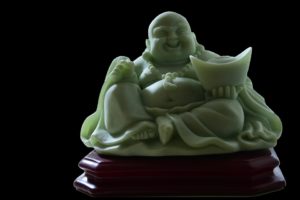Virtually everyone wants to feel good. Perhaps they want to be contented, happy, blissful, or something else, but I’ve never met anyone who wanted to feel awful.
The problem is that most people don’t know how to be happy. If they are happy, they don’t really understand what they have, and how others could get it. What works for one, rarely works for most other people.
So, how to be happy?
There are a lot of books about happiness. Most of them have a simple formula, varying in details:
Do/Get/Be X to get Happiness.
That is, you should get friends, or self-esteem, or money, or make a list of things you’re grateful about every day, or create a story about your life, or…
The great spiritual traditions generally say something else.
 Our nature is happiness (well, actually bliss) and getting objects or doing things expecting those actions or objects to make you happy won’t work.
Our nature is happiness (well, actually bliss) and getting objects or doing things expecting those actions or objects to make you happy won’t work.
My experience is that this is true.
The research is also pretty clear: You do/get something you think will make you happy–perhaps a raise or a great lover or a lottery win–and a few months to two years later you’re back to your previous level of happiness.
Getting “things” doesn’t really work, though there are some minor exceptions (and this isn’t a book, so I’ll skip those for now).
Now, it is true that if you’re in a ton of pain all the time, you’re going to have a problem being happy. It can be done, but probably not if you didn’t do the pre-work before getting sick.
On the other hand, most chronic illness doesn’t necessarily disqualify you from being happy. I say this from experience.
So then, all the introductions and caveats aside, how should one become happy?
Get rid of the shit that stands in the way of being happy.
I remember very clearly the period after I first actually understood this. Suddenly I noticed that there was all this wonderful food around: Chinese, Indian, good roast beef, cheese!, curried goat, fruits, garlic toast, and on and on.
Everything I wanted to cook, fantastic food was available. If it was food I didn’t know how to cook, I could buy it cooked. And plenty of good food was cheap.
Marvelous!
And music! Music. Music. It was everywhere, cheap, and free, and marvelous. The music of hundreds of years of civilization, performed by the best musicians in the world, available to me at the touch of a few buttons.
And the women (and a few men, but mostly women, hey, I have my preferences), were beautiful. There was art. There were fantastic buildings. At night I slept inside, in a warm house in winter, a cool one in summer. I had food, art, entertainment, and beauty available to me everywhere.
I became open to happiness.
So many people walk through life, as I had, unable to appreciate its wonders. I’m the first, as long-time readers know, to note that a lot of life is absolute crap, and yeah, in many ways this is a hell-world, and while this is not the worst timeline (that’d be nuclear war), it’s certainly a bad and remarkably stupid one.
But the world is still full of beauty, the warmth of love is still real, and even simple food is still marvelous.
The first stage of happiness is simply being available to it. Most people aren’t. They are so caught up in their worries, fears, and desires that they can’t see what they already have.
All you need to have this basic level of happiness, which is way more than most people older than ten or so seem to have, is stop letting your fears, worries, and desires get in the way.
This is why early meditation practitioners who’ve made a bit of progress are always dribbling on tiresomely about being present. But it’s not really being present that’s important, it’s not dwelling.
We all have problems. We all have fears. We all have desires.
Fine. Have them. But don’t let them have you. If all you can see is them, you are missing most of what the world offers you ever single day.
So, let them go. Don’t dwell.
Don’t worry about anything you can’t control.
Don’t dwell on anything bad that isn’t happening now. Do what you’re willing to do about it, then put it down. This includes both bad things that happened in the past, and bad things you think will happen in the future. (And which often won’t.)
Don’t spend time castigating yourself because you think you suck. Perhaps you weigh too much, have too little money, aren’t loving enough, competent enough, or any other failure.
Fuck it. Drop it. Do whatever you’re going to do about it, and stop worrying about it.
The formula for simple happiness is just to not be too busy mentally to notice all the happiness available to you right now.
I’m not saying this is easy. When you get down to it, it’s about doing nothing. But before you get to doing nothing, you often have to do a lot of things. Maybe that’s some sort of therapy or maybe it’s meditation or other spiritual practices (genuine belief in a benevolent God does work well). Or maybe you’re one of the very lucky, very few who can just drop everything once you realize it makes sense.
But the core isn’t doing. It’s not doing. Just get out of the way. The human body knows how to be happy, and all it really takes is not being scared, not wanting something to point where you dwell on it, and not worrying, including not worrying about how think you suck.
This is a large part of what is meant by “just drop it all.”
None of this means you’ll be happy all the time. It does mean you’ll be happy a lot and that you won’t tend to dwell on unhappiness. Sufficient to whenever it happens is the crap of life. It shouldn’t destroy your happiness before or afterwards.
So… be happy. I’d like to see more of that. Misery serves no one. It doesn’t serve us when we’re miserable and it doesn’t harm our enemies. Might as well be happy.
(This is the first stage of happiness. More on the happiness in Part II.)
The results of the work I do, like this article, are free, but food isn’t, so if you value my work, please DONATE or SUBSCRIBE.

